Ethical Decision Making in Professional Environments Assignment
VerifiedAdded on 2020/05/28
|7
|1206
|535
Homework Assignment
AI Summary
This assignment analyzes an ethical dilemma faced by Hardeep, a manager in a government department. The core issue revolves around a conflict of interest: Hardeep must decide between awarding a contract to Company A, which offers the best value for the department, or to Company B, owned by his friend Mandeep. The assignment utilizes the McDonald's framework to navigate the ethical complexities. It identifies stakeholders (Hardeep, the government department, Companies A and B, and Mandeep), relevant values (trust, personal autonomy, and fairness), and potential burdens and benefits of each decision. The analysis references legal frameworks such as the Corporation Act and the ACS Code of Ethics, emphasizing honesty and the primacy of public interest. The solution recommends that Hardeep prioritize the government department's best interests and adhere to legal and ethical guidelines, even if it strains his friendship. The assignment also includes a bibliography citing relevant sources on business ethics and professional conduct.
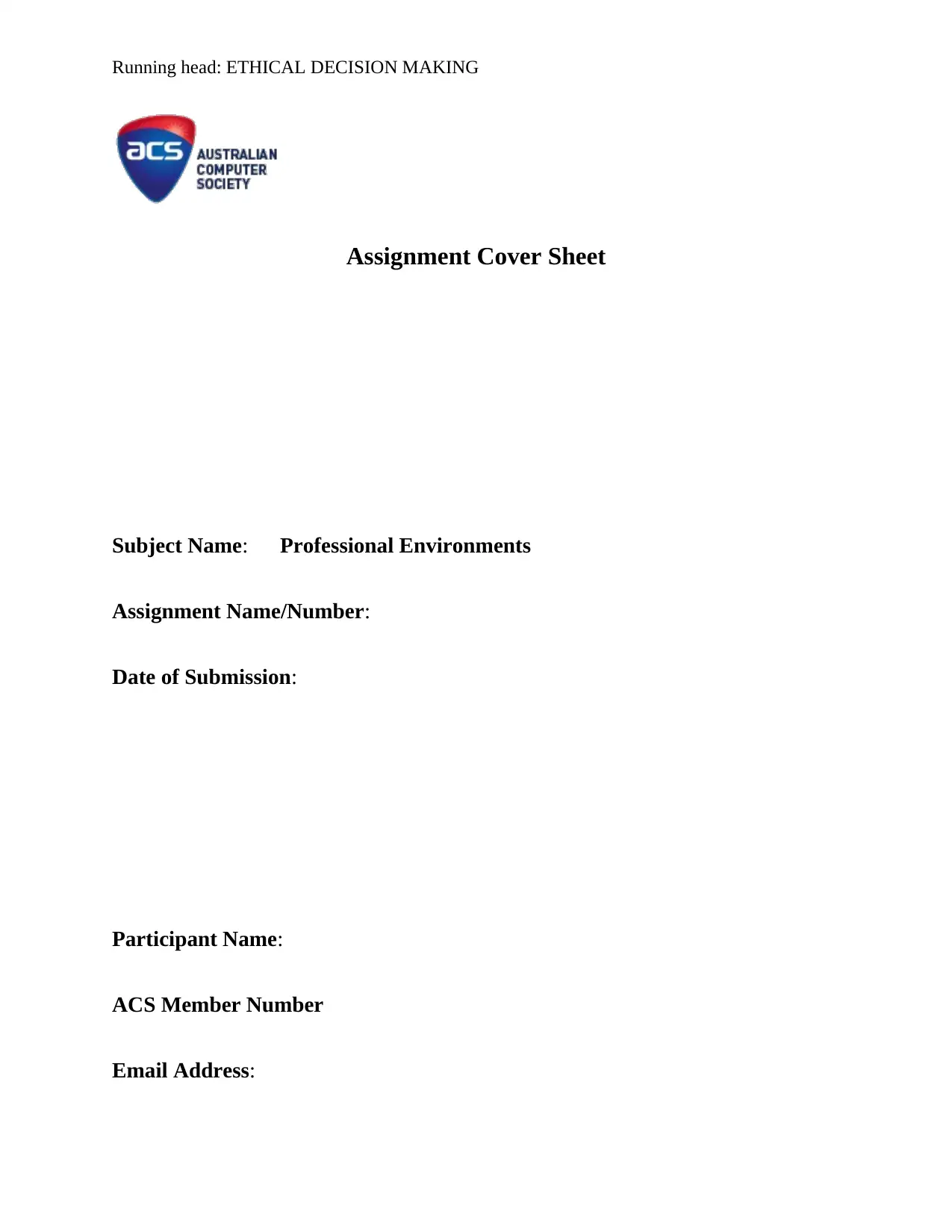
Running head: ETHICAL DECISION MAKING
Assignment Cover Sheet
Subject Name: Professional Environments
Assignment Name/Number:
Date of Submission:
Participant Name:
ACS Member Number
Email Address:
Assignment Cover Sheet
Subject Name: Professional Environments
Assignment Name/Number:
Date of Submission:
Participant Name:
ACS Member Number
Email Address:
Paraphrase This Document
Need a fresh take? Get an instant paraphrase of this document with our AI Paraphraser
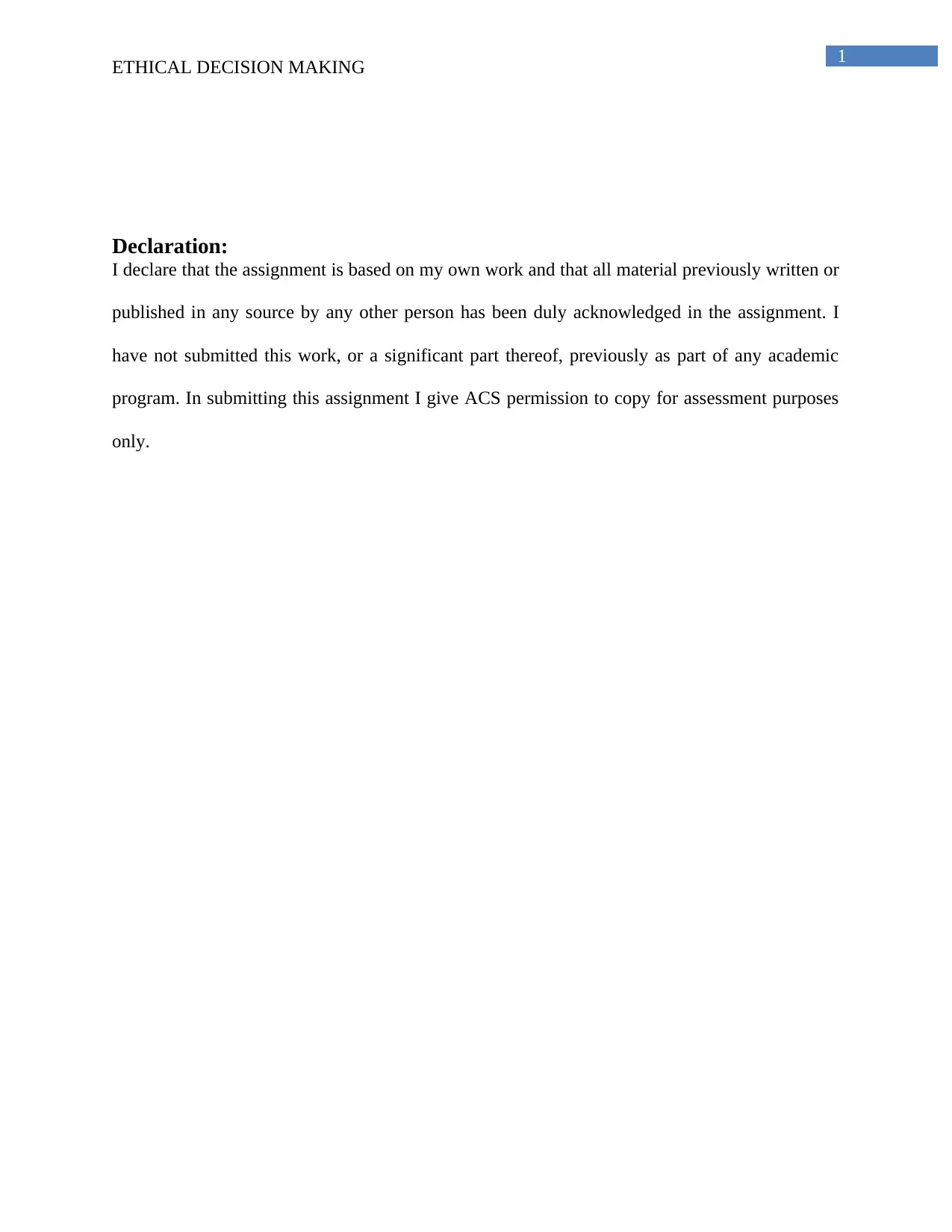
1
ETHICAL DECISION MAKING
Declaration:
I declare that the assignment is based on my own work and that all material previously written or
published in any source by any other person has been duly acknowledged in the assignment. I
have not submitted this work, or a significant part thereof, previously as part of any academic
program. In submitting this assignment I give ACS permission to copy for assessment purposes
only.
ETHICAL DECISION MAKING
Declaration:
I declare that the assignment is based on my own work and that all material previously written or
published in any source by any other person has been duly acknowledged in the assignment. I
have not submitted this work, or a significant part thereof, previously as part of any academic
program. In submitting this assignment I give ACS permission to copy for assessment purposes
only.
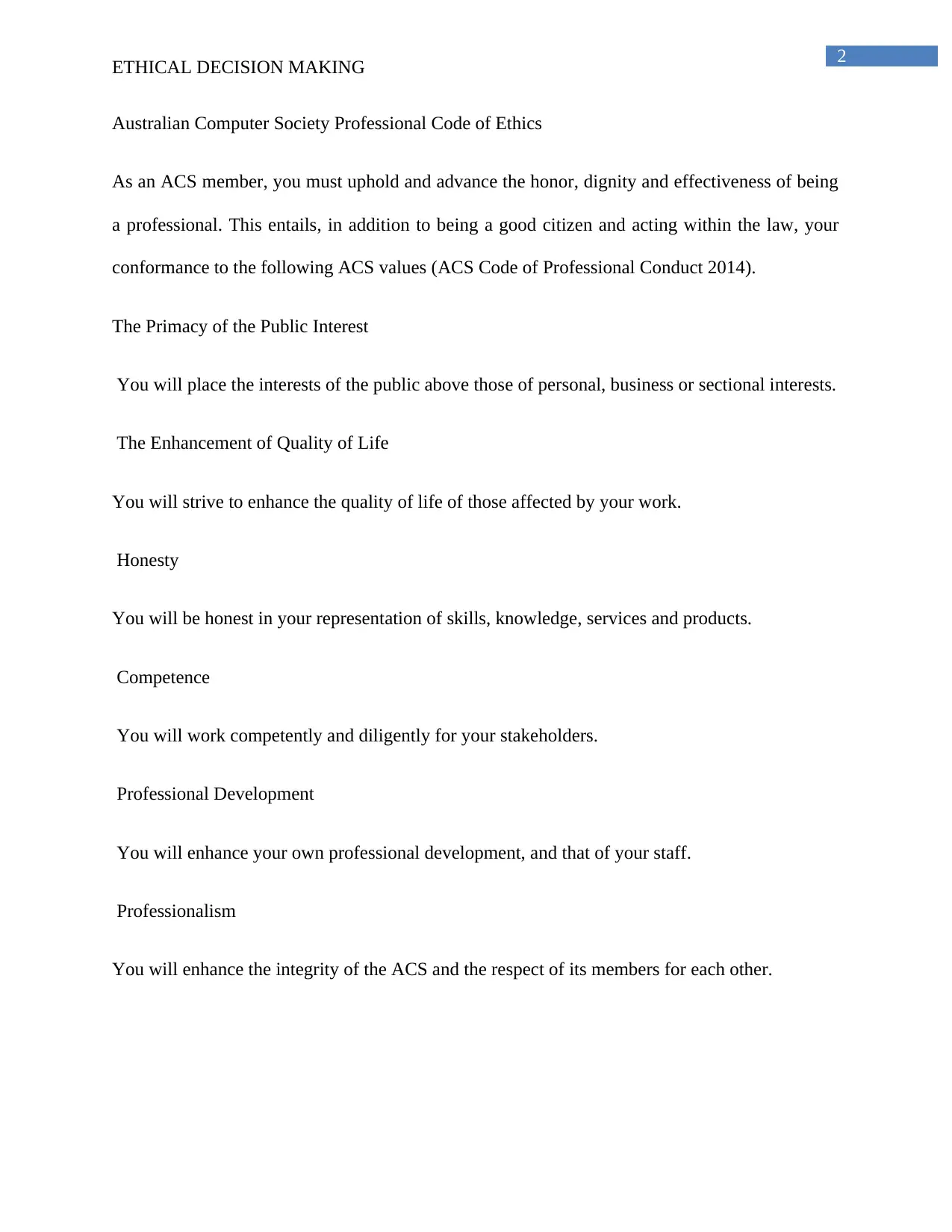
2
ETHICAL DECISION MAKING
Australian Computer Society Professional Code of Ethics
As an ACS member, you must uphold and advance the honor, dignity and effectiveness of being
a professional. This entails, in addition to being a good citizen and acting within the law, your
conformance to the following ACS values (ACS Code of Professional Conduct 2014).
The Primacy of the Public Interest
You will place the interests of the public above those of personal, business or sectional interests.
The Enhancement of Quality of Life
You will strive to enhance the quality of life of those affected by your work.
Honesty
You will be honest in your representation of skills, knowledge, services and products.
Competence
You will work competently and diligently for your stakeholders.
Professional Development
You will enhance your own professional development, and that of your staff.
Professionalism
You will enhance the integrity of the ACS and the respect of its members for each other.
ETHICAL DECISION MAKING
Australian Computer Society Professional Code of Ethics
As an ACS member, you must uphold and advance the honor, dignity and effectiveness of being
a professional. This entails, in addition to being a good citizen and acting within the law, your
conformance to the following ACS values (ACS Code of Professional Conduct 2014).
The Primacy of the Public Interest
You will place the interests of the public above those of personal, business or sectional interests.
The Enhancement of Quality of Life
You will strive to enhance the quality of life of those affected by your work.
Honesty
You will be honest in your representation of skills, knowledge, services and products.
Competence
You will work competently and diligently for your stakeholders.
Professional Development
You will enhance your own professional development, and that of your staff.
Professionalism
You will enhance the integrity of the ACS and the respect of its members for each other.
⊘ This is a preview!⊘
Do you want full access?
Subscribe today to unlock all pages.

Trusted by 1+ million students worldwide
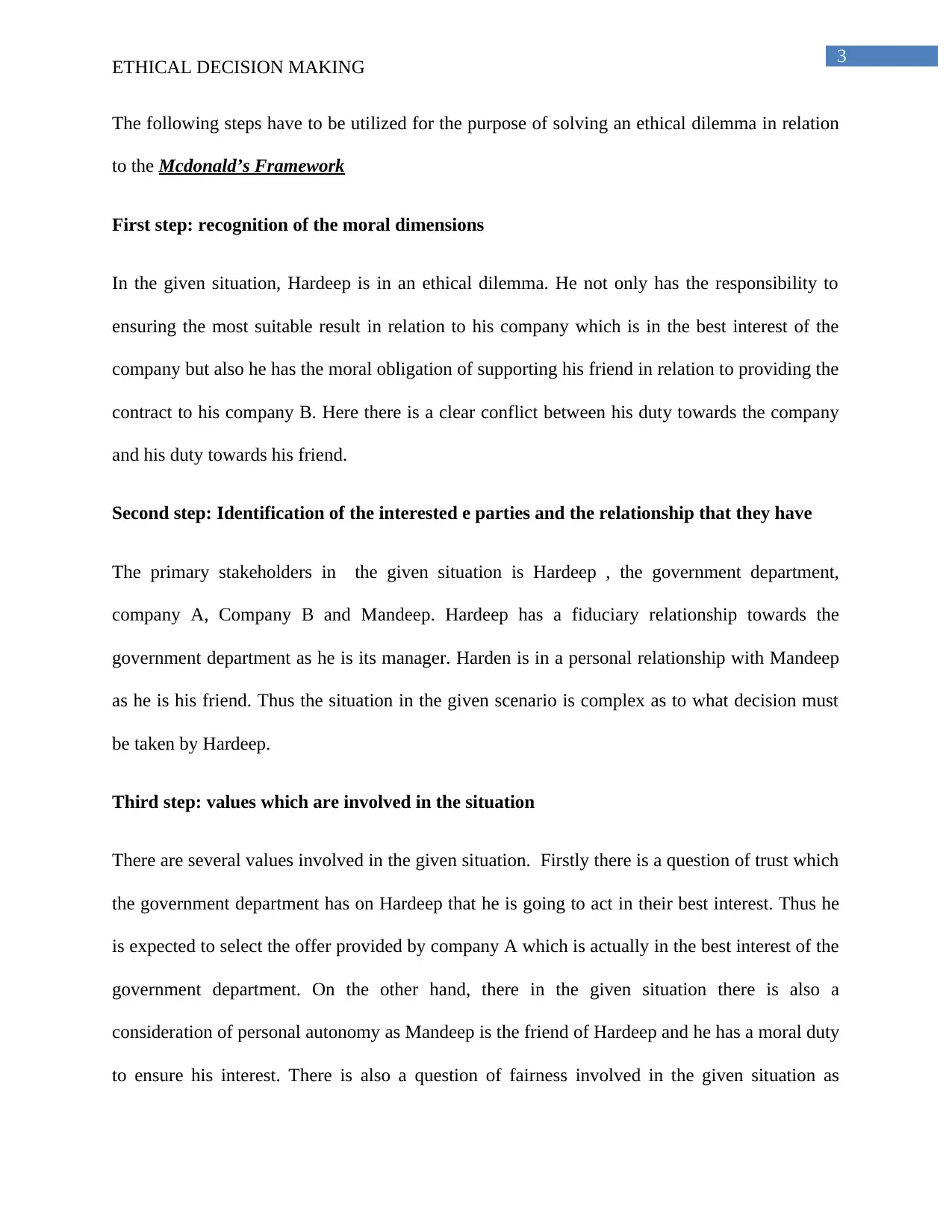
3
ETHICAL DECISION MAKING
The following steps have to be utilized for the purpose of solving an ethical dilemma in relation
to the Mcdonald’s Framework
First step: recognition of the moral dimensions
In the given situation, Hardeep is in an ethical dilemma. He not only has the responsibility to
ensuring the most suitable result in relation to his company which is in the best interest of the
company but also he has the moral obligation of supporting his friend in relation to providing the
contract to his company B. Here there is a clear conflict between his duty towards the company
and his duty towards his friend.
Second step: Identification of the interested e parties and the relationship that they have
The primary stakeholders in the given situation is Hardeep , the government department,
company A, Company B and Mandeep. Hardeep has a fiduciary relationship towards the
government department as he is its manager. Harden is in a personal relationship with Mandeep
as he is his friend. Thus the situation in the given scenario is complex as to what decision must
be taken by Hardeep.
Third step: values which are involved in the situation
There are several values involved in the given situation. Firstly there is a question of trust which
the government department has on Hardeep that he is going to act in their best interest. Thus he
is expected to select the offer provided by company A which is actually in the best interest of the
government department. On the other hand, there in the given situation there is also a
consideration of personal autonomy as Mandeep is the friend of Hardeep and he has a moral duty
to ensure his interest. There is also a question of fairness involved in the given situation as
ETHICAL DECISION MAKING
The following steps have to be utilized for the purpose of solving an ethical dilemma in relation
to the Mcdonald’s Framework
First step: recognition of the moral dimensions
In the given situation, Hardeep is in an ethical dilemma. He not only has the responsibility to
ensuring the most suitable result in relation to his company which is in the best interest of the
company but also he has the moral obligation of supporting his friend in relation to providing the
contract to his company B. Here there is a clear conflict between his duty towards the company
and his duty towards his friend.
Second step: Identification of the interested e parties and the relationship that they have
The primary stakeholders in the given situation is Hardeep , the government department,
company A, Company B and Mandeep. Hardeep has a fiduciary relationship towards the
government department as he is its manager. Harden is in a personal relationship with Mandeep
as he is his friend. Thus the situation in the given scenario is complex as to what decision must
be taken by Hardeep.
Third step: values which are involved in the situation
There are several values involved in the given situation. Firstly there is a question of trust which
the government department has on Hardeep that he is going to act in their best interest. Thus he
is expected to select the offer provided by company A which is actually in the best interest of the
government department. On the other hand, there in the given situation there is also a
consideration of personal autonomy as Mandeep is the friend of Hardeep and he has a moral duty
to ensure his interest. There is also a question of fairness involved in the given situation as
Paraphrase This Document
Need a fresh take? Get an instant paraphrase of this document with our AI Paraphraser
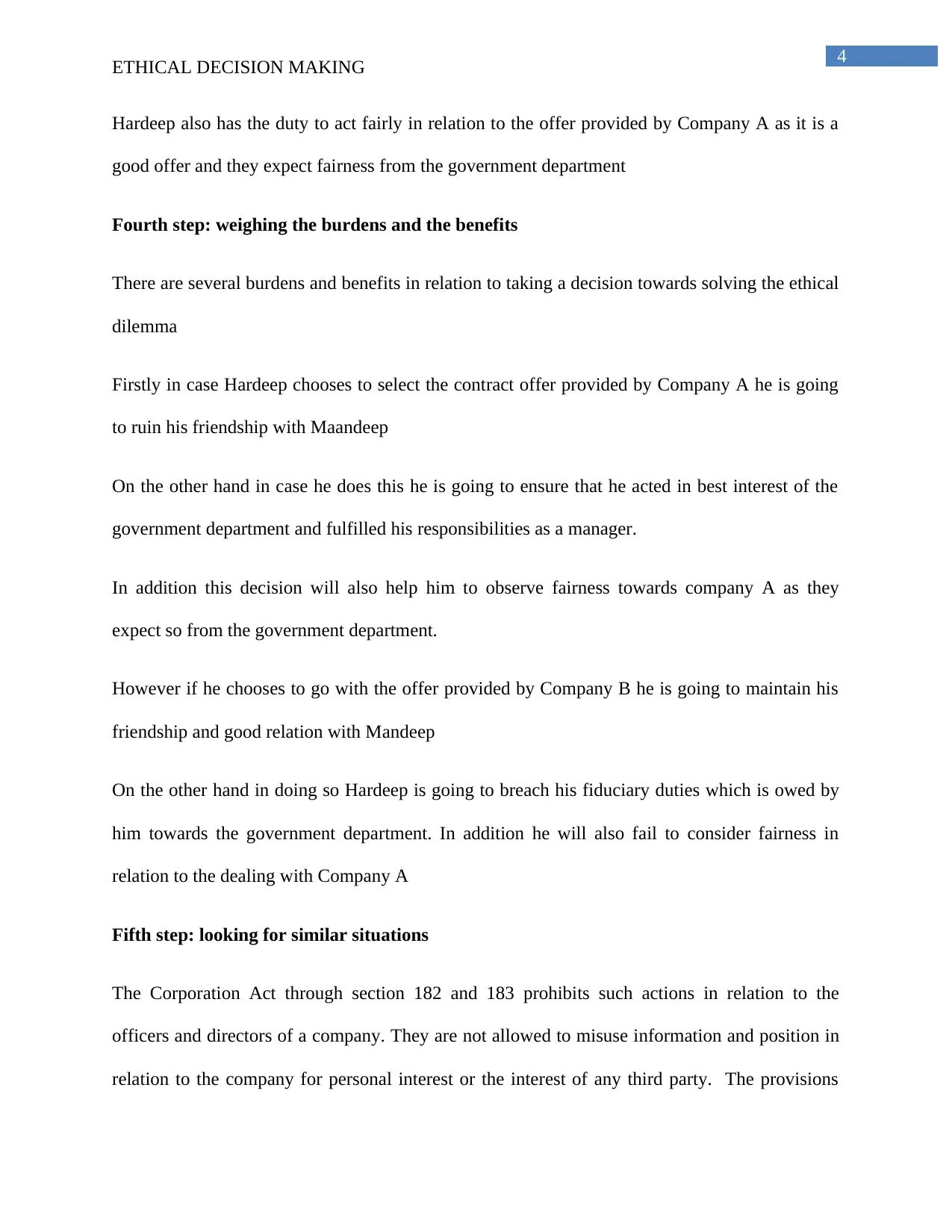
4
ETHICAL DECISION MAKING
Hardeep also has the duty to act fairly in relation to the offer provided by Company A as it is a
good offer and they expect fairness from the government department
Fourth step: weighing the burdens and the benefits
There are several burdens and benefits in relation to taking a decision towards solving the ethical
dilemma
Firstly in case Hardeep chooses to select the contract offer provided by Company A he is going
to ruin his friendship with Maandeep
On the other hand in case he does this he is going to ensure that he acted in best interest of the
government department and fulfilled his responsibilities as a manager.
In addition this decision will also help him to observe fairness towards company A as they
expect so from the government department.
However if he chooses to go with the offer provided by Company B he is going to maintain his
friendship and good relation with Mandeep
On the other hand in doing so Hardeep is going to breach his fiduciary duties which is owed by
him towards the government department. In addition he will also fail to consider fairness in
relation to the dealing with Company A
Fifth step: looking for similar situations
The Corporation Act through section 182 and 183 prohibits such actions in relation to the
officers and directors of a company. They are not allowed to misuse information and position in
relation to the company for personal interest or the interest of any third party. The provisions
ETHICAL DECISION MAKING
Hardeep also has the duty to act fairly in relation to the offer provided by Company A as it is a
good offer and they expect fairness from the government department
Fourth step: weighing the burdens and the benefits
There are several burdens and benefits in relation to taking a decision towards solving the ethical
dilemma
Firstly in case Hardeep chooses to select the contract offer provided by Company A he is going
to ruin his friendship with Maandeep
On the other hand in case he does this he is going to ensure that he acted in best interest of the
government department and fulfilled his responsibilities as a manager.
In addition this decision will also help him to observe fairness towards company A as they
expect so from the government department.
However if he chooses to go with the offer provided by Company B he is going to maintain his
friendship and good relation with Mandeep
On the other hand in doing so Hardeep is going to breach his fiduciary duties which is owed by
him towards the government department. In addition he will also fail to consider fairness in
relation to the dealing with Company A
Fifth step: looking for similar situations
The Corporation Act through section 182 and 183 prohibits such actions in relation to the
officers and directors of a company. They are not allowed to misuse information and position in
relation to the company for personal interest or the interest of any third party. The provisions
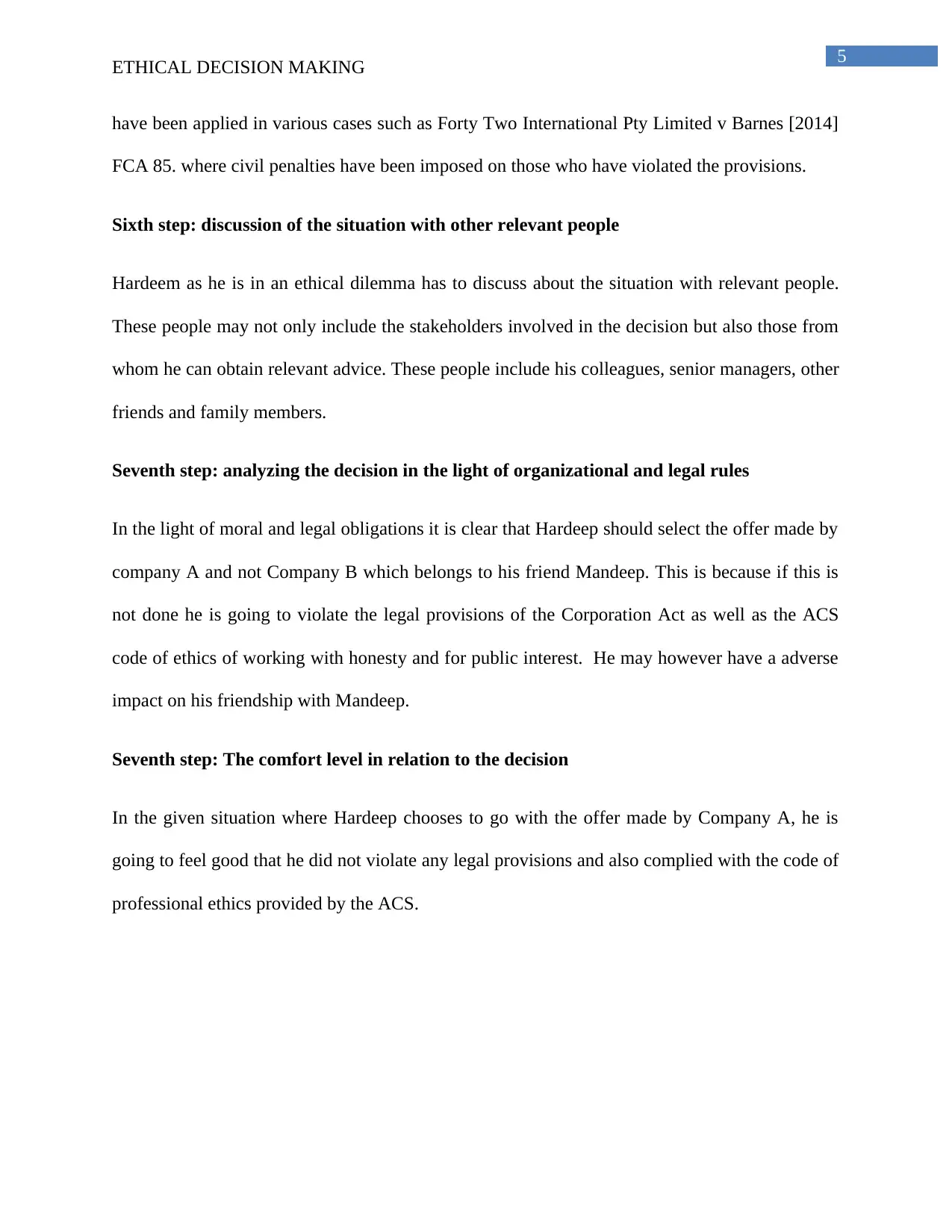
5
ETHICAL DECISION MAKING
have been applied in various cases such as Forty Two International Pty Limited v Barnes [2014]
FCA 85. where civil penalties have been imposed on those who have violated the provisions.
Sixth step: discussion of the situation with other relevant people
Hardeem as he is in an ethical dilemma has to discuss about the situation with relevant people.
These people may not only include the stakeholders involved in the decision but also those from
whom he can obtain relevant advice. These people include his colleagues, senior managers, other
friends and family members.
Seventh step: analyzing the decision in the light of organizational and legal rules
In the light of moral and legal obligations it is clear that Hardeep should select the offer made by
company A and not Company B which belongs to his friend Mandeep. This is because if this is
not done he is going to violate the legal provisions of the Corporation Act as well as the ACS
code of ethics of working with honesty and for public interest. He may however have a adverse
impact on his friendship with Mandeep.
Seventh step: The comfort level in relation to the decision
In the given situation where Hardeep chooses to go with the offer made by Company A, he is
going to feel good that he did not violate any legal provisions and also complied with the code of
professional ethics provided by the ACS.
ETHICAL DECISION MAKING
have been applied in various cases such as Forty Two International Pty Limited v Barnes [2014]
FCA 85. where civil penalties have been imposed on those who have violated the provisions.
Sixth step: discussion of the situation with other relevant people
Hardeem as he is in an ethical dilemma has to discuss about the situation with relevant people.
These people may not only include the stakeholders involved in the decision but also those from
whom he can obtain relevant advice. These people include his colleagues, senior managers, other
friends and family members.
Seventh step: analyzing the decision in the light of organizational and legal rules
In the light of moral and legal obligations it is clear that Hardeep should select the offer made by
company A and not Company B which belongs to his friend Mandeep. This is because if this is
not done he is going to violate the legal provisions of the Corporation Act as well as the ACS
code of ethics of working with honesty and for public interest. He may however have a adverse
impact on his friendship with Mandeep.
Seventh step: The comfort level in relation to the decision
In the given situation where Hardeep chooses to go with the offer made by Company A, he is
going to feel good that he did not violate any legal provisions and also complied with the code of
professional ethics provided by the ACS.
⊘ This is a preview!⊘
Do you want full access?
Subscribe today to unlock all pages.

Trusted by 1+ million students worldwide
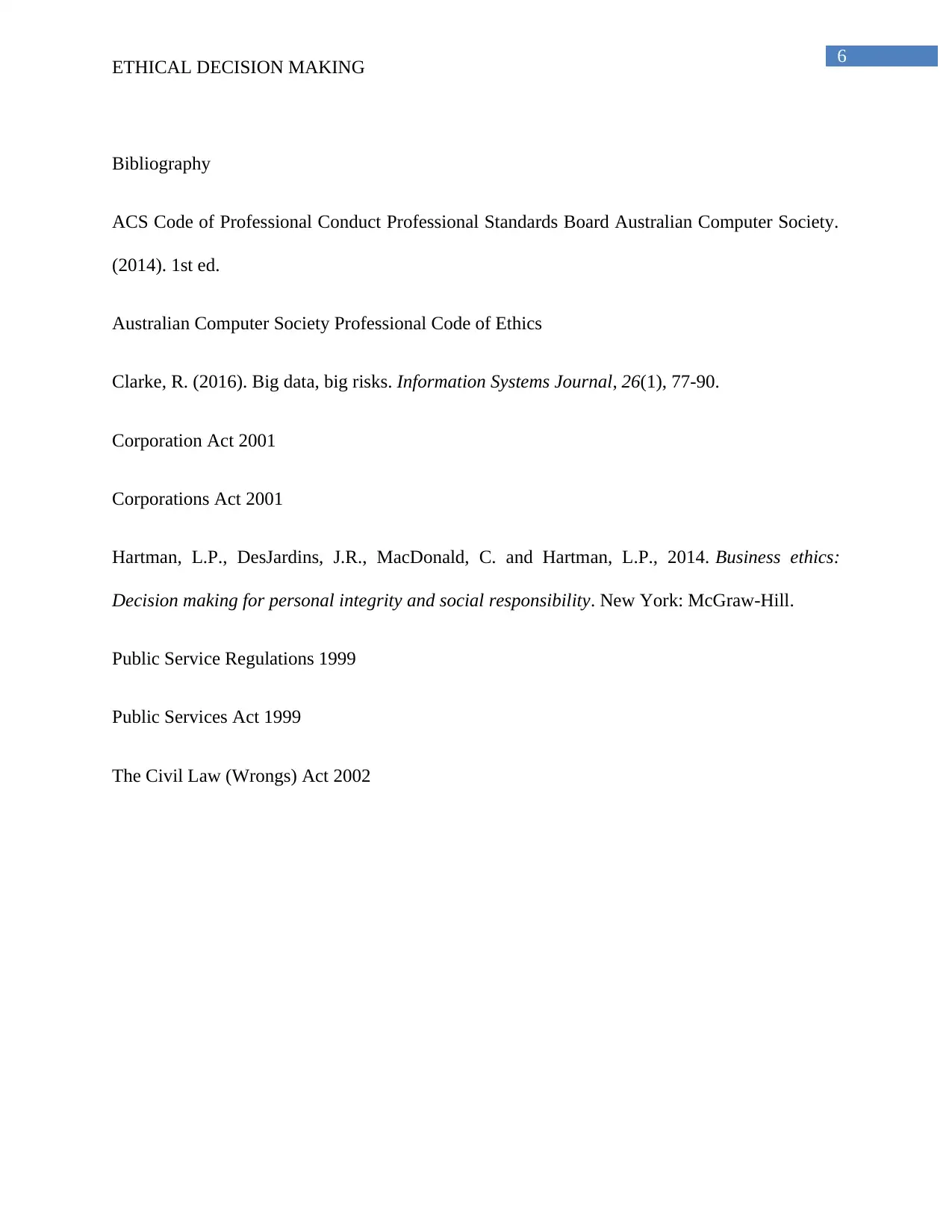
6
ETHICAL DECISION MAKING
Bibliography
ACS Code of Professional Conduct Professional Standards Board Australian Computer Society.
(2014). 1st ed.
Australian Computer Society Professional Code of Ethics
Clarke, R. (2016). Big data, big risks. Information Systems Journal, 26(1), 77-90.
Corporation Act 2001
Corporations Act 2001
Hartman, L.P., DesJardins, J.R., MacDonald, C. and Hartman, L.P., 2014. Business ethics:
Decision making for personal integrity and social responsibility. New York: McGraw-Hill.
Public Service Regulations 1999
Public Services Act 1999
The Civil Law (Wrongs) Act 2002
ETHICAL DECISION MAKING
Bibliography
ACS Code of Professional Conduct Professional Standards Board Australian Computer Society.
(2014). 1st ed.
Australian Computer Society Professional Code of Ethics
Clarke, R. (2016). Big data, big risks. Information Systems Journal, 26(1), 77-90.
Corporation Act 2001
Corporations Act 2001
Hartman, L.P., DesJardins, J.R., MacDonald, C. and Hartman, L.P., 2014. Business ethics:
Decision making for personal integrity and social responsibility. New York: McGraw-Hill.
Public Service Regulations 1999
Public Services Act 1999
The Civil Law (Wrongs) Act 2002
1 out of 7
Related Documents
Your All-in-One AI-Powered Toolkit for Academic Success.
+13062052269
info@desklib.com
Available 24*7 on WhatsApp / Email
![[object Object]](/_next/static/media/star-bottom.7253800d.svg)
Unlock your academic potential
Copyright © 2020–2026 A2Z Services. All Rights Reserved. Developed and managed by ZUCOL.





